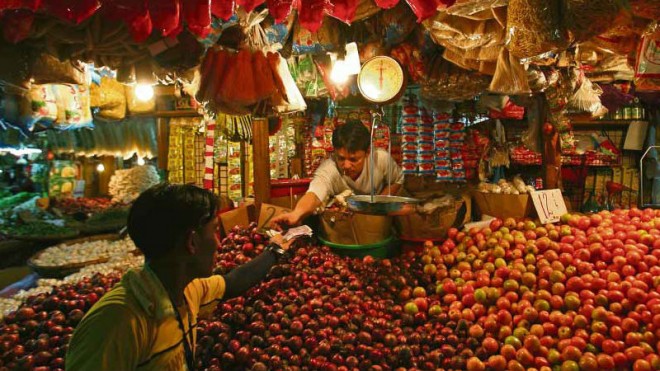Inflation, wage top poll issues

LOWER PURCHASING POWER A customer buys vegetables at a market in Quezon City. Increasing prices erode consumers’ purchasing power. RAFFY LERMA
FOR VOTERS, what are the major issues in next year’s general elections?
For Pedro Maranas, a 38-year-old junk collector in Las Piñas City, the issues are poverty and jobs with proper wages.
“Life is harder nowadays. It is even harder now that we hear about corrupt government officials stealing public money,” he said.
Like Maranas, most Filipinos are concerned about reducing poverty, improving wages and eradicating official corruption, according to a recent survey by Pulse Asia Inc.
Pulse Asia’s Ulat ng Bayan survey, conducted from May 30 to June 5, showed that the respondents were most concerned about inflation and wages.
Article continues after this advertisementIt showed that controlling inflation (47 percent) and improving wages (46 percent) are their major concerns, followed by official corruption (39 percent), employment (36 percent) and poverty (35 percent).
Article continues after this advertisementOther urgent national concerns include peace (21 percent), criminality (20 percent), rule of law (16 percent) and environmental destruction (15 percent).
Filipinos are least concerned about controlling population growth (9 percent), national territorial integrity (7 percent), constitutional amendment (4 percent) and terrorism (4 percent).
Across geographic areas and socioeconomic classes, the only issues deemed urgent by majorities are wages (53 percent in Metro Manila), employment (51 percent in the Visayas), and inflation (53 percent in Mindanao and 52 percent in Class E).
In Luzon outside Metro Manila, the topmost concerns are wages (46 percent) and inflation (45 percent).
Respondents from Classes ABC and D are most concerned about wages (48 percent and 46 percent, respectively), official corruption (43 percent and 42 percent, respectively), and inflation (40 percent and 46 percent, respectively).
The survey, which used face-to-face interviews with 1,200 respondents, had a margin of error of plus-or-minus 3 percentage points.
Inflation
Nearly half of the respondents (47 percent) cited controlling inflation as an urgent national concern in the latest Pulse Asia survey, with 42 percent in Metro Manila, 45 percent in Luzon outside Metro Manila, 47 percent in the Visayas and 53 percent in Mindanao, as well as 40 percent in Class ABC, 46 percent in Class D and 52 percent in Class E echoing the sentiment.
What is inflation? It refers to the rate of increase in prices of goods and services that consumers usually buy. To measure inflation, economic analysts look at the consumer price index (CPI), which represents the general cost of products typically bought by consumers. Inflation, which is expressed as percentage, reflects an increase in the CPI.
In August, inflation was at an all-time low of 0.6 percent. This means that on average, the prices of goods and services consumers bought during the month was 0.6 percent higher than a year ago.
Despite decelerating inflation, controlling the prices of goods and services is among the top concerns of most Filipinos.
“It only shows how sensitive economic welfare is to even very small changes in prices and wages, especially insofar as the poor and near-poor are concerned,” said Ernesto Pernia, professor at the University of the Philippines’ School of Economics.
“Also, among economic variables, prices and wages are among the most volatile—they can go up or down almost day-by-day,” Pernia added.
How does inflation affect consumers?
When prices of goods and services rise, the value of money declines.
Inflation erodes the purchasing power of consumers.
If inflation is high, consumers may have to spend more to buy the same goods and services they purchased a year earlier. Or, in other words, the same amount of money would buy less after inflation.
Moreover, if inflation accelerates while wages stay the same, it would require a bigger portion of people’s income to buy the same goods and services.